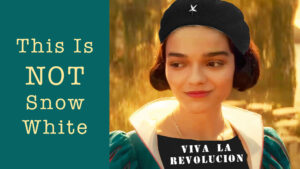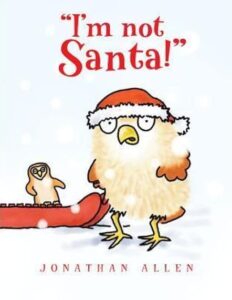Netflix has a very poor record when it comes to adapting works of classic literature. Instead of coming up with original stories, the streaming giant tends to pick off the skin of beloved characters and use them to act out modern day political and social issues. It’s frustrating to prejudge a show that doesn’t even have a script or a cast yet, but at this point the pattern has been repeated so many times that it’s hard for me not to believe that another bucket of slop is on the way.
Tag: adaptations
162 – 2024 and 2025 in Film
At the beginning of the year, I made predictions about films based on children’s books that would come out in 2024. Was I right? Was I wrong? And what’s coming up in 2025? (AND HAPPY NEW YEAR!)
This episode managed to get published somehow despite
- kids screaming and opening the door
- a barking dog
- my equipment failing several times
- needing to get this done in a hurry because everyone was waiting for me to start cooking dinner
159 – This Is NOT Snow White
I didn’t think I’d have much to say about Disney’s latest live action remake, Snow White, until it actually came out. But unfortunately a new trailer has revealed such substantial changes to the story that I can already say this will have little to do with the beloved folktale recorded by the Brothers Grimm or Disney’s 1937 film, which was groundbreaking not only in its artisty but in its casting choice for the lead role.

In this episode, I briefly show a quotation from filmmaker Dallas Jenkins regarding how to adapt the text of a book into a film. This came from an interview Jenkins participated in on the channel SeanChandlerTalksAbout . You can see the entire interview, which has useful things to say about adapting fiction to the screen, here: https://www.youtube.com/watch?v=ZAhix0coMrs
Also in this episode, hear about my upcoming plans for the show as well as the book we’ve been reading this week: I’m Not Santa by Jonathan Allen. My kids found it at the library and they LOVE it. There’s lots of chances to do funny voices and fake crying, and the more dramatic you go the bigger the laughs will be.

156 – Will Wicked Connect with Kids?
In this episode, co-host Chloë tells us about Sapphire Battersea, a book that’s really captured her. She has loved every book that she has ever read by Jacqueline Wilson, and whether this author is tackling grounded, real-world family drama or the more fantastical world of circus sideshows, Chloë has always noticed and latched onto the struggles of children born to working class families.
In the main segment, the film adaptation of the stage musical Wicked will be out in a few days and the marketing push is ON. This movie is several artistic generations removed from The Wonderful Wizard of Oz by L. Frank Baum. The musical is beloved the world over, but mainly by adults. Will this film bring the story back to families and children? Will the drama around its marketing cause problems? Or is it just too darn long for kids to sit through? Let us know what you think!
146 – Snow Much Drama
The drama around Snow White, the troubled remake of Disney’s 1937 masterpiece, is unfortunate because it really was unnecessary! Just a little bit of familiarity with the folktale published by the Brothers Grimm in 1812 could have spared the filmmakers (and some outspoken actors) a lot of time and trouble. Also in this episode, you get your last chance to ask show hosts anything! We’ll be having a mailbag party for our 150th episode.
There is also a video version of my thoughts on the Snow White drama, which are included in this episode:
I also had the pleasant surprise of seeing the new trailer for War of the Rohirrim, an upcoming film based on the legend outlined in the appendix to The Lord of the Rings by J.R.R. Tolkien. Here’s my reaction to that:
145 – Film Review: Harold and The Purple Crayon
I predicted that the film adaptation of Harold and the Purple Crayon by Crockett Johnson would focus too much on adults at the expense of telling a story for children. It looks like I was right.
And shockingly . . . I’m about to make the case that Deadpool and Wolverine is more of a film for the children (well, for the inner children of adults) than the adaptation of Harold and the Purple Crayon, because it centers the kinds of themes and adventures that kids actually care about, instead of focusing on a bunch of adult nonsense. I really did not expect to talk about Deadpool on a show about children’s literature, but there it is. I also didn’t expect to veer into the territory of beauty standards and cosmetic procedures, but it came up in a surprising and somewhat uncomfortable way.
144 – The Tale of Jemima Puddle-Duck by Quantum Theatre
Co-hosts T.Q. Townsend and Chloë Townsend (and the rest of the family) saw a very funny musical production of The Tale of Jemima Puddle-Duck put on by Quantum Theatre at Bradgate Park in Leicestershire. This was NOT a show that was just for kids. Parents were laughing just as much as the children, and the creative use of minimal costumes and props gave the play the familiar feel of the kind of acting that children naturally do.
One thing we forgot to mention in the review is how awesome the programs were! Usually play programs just have the synopsis and cast and such, but this one had a lot of interesting information for the kids to read as well as a bunch of fun activities to keep them occupied while they waited for the show to start. Never thought I’d review a play program, but I am pleased to have that as a first.
Catch future performances before the tour is over! Book tickets at www.quantumtheatre.co.uk.
Learn more about Bradgate Park in Leicestershire at bradgatepark.org.
Rings of Power is NOT an Adaptation
This little video wasn’t long enough to be a regular episode, but I felt it was worth explaining that the TV show Rings of Power isn’t worth getting upset about because it’s not actually an adaptation at all. It has a lot more in common with what happened when me and my cousin played with action figures back in the day . . .
138 – Can Peter Jackson Recapture the Magic?
Peter Jackson is getting the band back together to make movies about . . . finding Gollum?? For real? Will these films be any good? Will this be another case of a filmmaker trying and failing to recapture the magic? Find out what I think about the prospects for these new films. Check out the video version to witness a perfect reenactment of what happened when I went to see The Phantom Menace in 1999, complete with butterfly hair clips.
137 – Peter Pan Goes Wrong made us LAUGH
Co-hosts T.Q. Townsend and Chloë Townsend recently went to the Curve Theatre in Leicester to see Peter Pan Goes Wrong, a hilarious comedy interpretation of J.M. Barrie’s classic children’s play and novel about Peter Pan, the Darling Children, the Lost Boys, and of course, Captain Hook. The play was put on by Mischief Theatre, a company that specializes in the most spectacularly silly shows we’ve ever seen.
We talk about which parts of the technical production were the most impressive, which parts of the story were the most interesting, and which moments just made us laugh the hardest. This play lovingly pokes fun at a story we all know very well, and that’s why it works. It’s also an example of how classic children’s stories never go out of style, and that there is always a fun, creative way to reinterpret them.
The traveling tour of Peter Pan Goes Wrong concluded in our city of Leicester, and we were lucky to catch one of the very last shows. But you can see it on video, or hopefully one day see it on stage as we did! Make sure you get there early though, because the show starts before “the show.”
